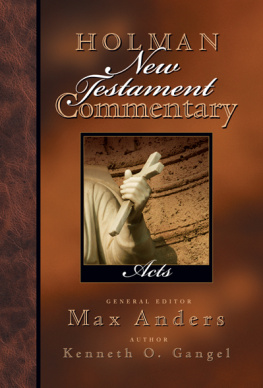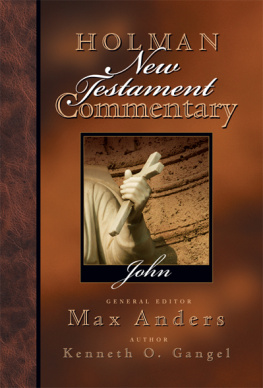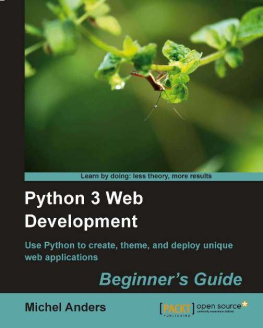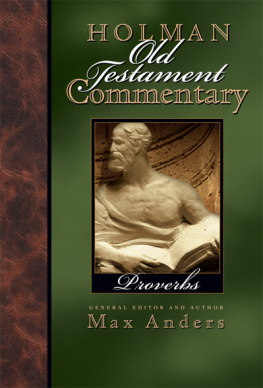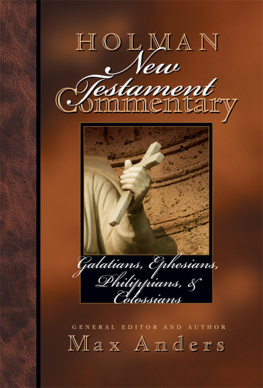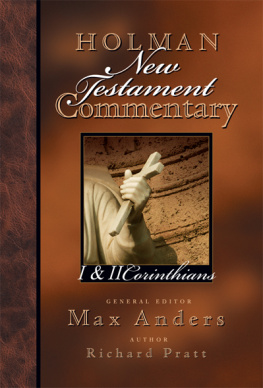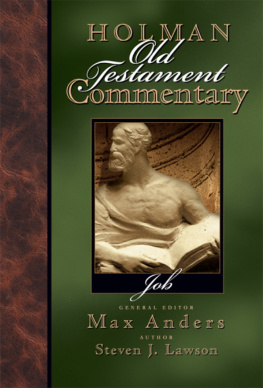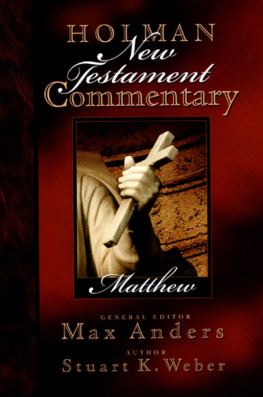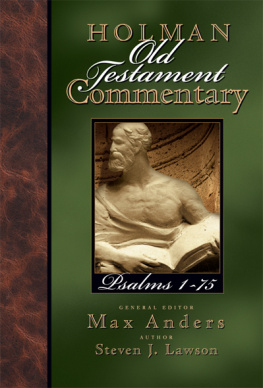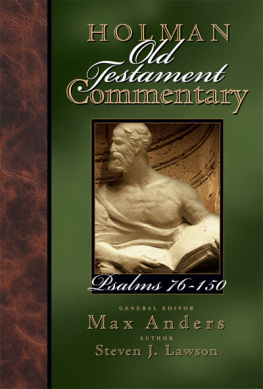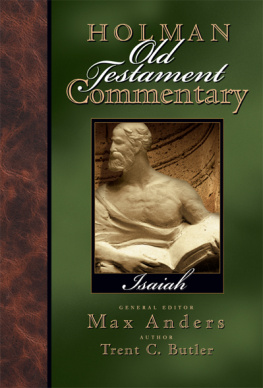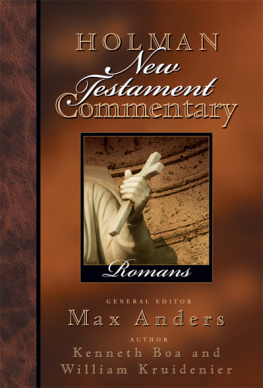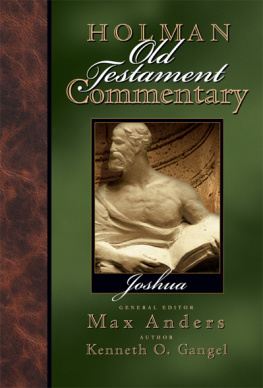Anders - Acts
Here you can read online Anders - Acts full text of the book (entire story) in english for free. Download pdf and epub, get meaning, cover and reviews about this ebook. year: 2010, publisher: B&H Publishing Group, genre: Religion. Description of the work, (preface) as well as reviews are available. Best literature library LitArk.com created for fans of good reading and offers a wide selection of genres:
Romance novel
Science fiction
Adventure
Detective
Science
History
Home and family
Prose
Art
Politics
Computer
Non-fiction
Religion
Business
Children
Humor
Choose a favorite category and find really read worthwhile books. Enjoy immersion in the world of imagination, feel the emotions of the characters or learn something new for yourself, make an fascinating discovery.
Acts: summary, description and annotation
We offer to read an annotation, description, summary or preface (depends on what the author of the book "Acts" wrote himself). If you haven't found the necessary information about the book — write in the comments, we will try to find it.
Anders: author's other books
Who wrote Acts? Find out the surname, the name of the author of the book and a list of all author's works by series.
Acts — read online for free the complete book (whole text) full work
Below is the text of the book, divided by pages. System saving the place of the last page read, allows you to conveniently read the book "Acts" online for free, without having to search again every time where you left off. Put a bookmark, and you can go to the page where you finished reading at any time.
Font size:
Interval:
Bookmark:



L uke held a high view of women, and I share that position. Particularly, the three women who helped in the preparation of this manuscript. Dividing transcription and typing chores equally were my former administrative assistant, Virginia Murray, and my present administrative assistant, Karen Grassmick. Checking each text and reference for accuracy fell to my loving wife Betty. Readers who profit from this work will want to remember their efforts as well as my own.
Kenneth O. Gangel
October 1996
Today's church hungers for Bible teaching and Bible teachers hunger for resources to guide them in teaching God's Word. The Holman New Testament Commentary provides the church with the food to feed the spiritually hungry in an easily digestible format. The result: new spiritual vitality that the church can readily use.
Bible teaching should result in new interest in the Scriptures, expanded Bible knowledge, discovery of specific Scriptural principles, relevant applications, and exciting living. The unique format of the Holman New Testament Commentary includes sections to achieve these results for every New Testament book.
Opening quotations from some of the church's best writers lead to an introductory illustration and discussion that draw individuals and study groups into the Word of God. In a Nutshell summarizes the content and teaching of the chapter. Verse-by-verse commentary answers the church's questions rather than raising issues scholars usually admit they cannot adequately solve. Bible principles and specific contemporary applications encourage students to move from Bible to contemporary times. A specific modern illustration then ties application vividly to present life. A brief prayer aids the student to commit his or her daily life to the principles and applications found in the Bible chapter being studied. For those still hungry for more, Deeper Discoveries take the student into a more personal, deeper study of the words, phrases, and themes of God's Word. Finally, a teaching outline provides transitional statements and conclusions along with an outline to assist the teacher in group Bible studies.
It is the editors prayer that this new resource for local church Bible teaching will enrich the ministry of group, as well as, individual Bible study, and that it will lead God's people to truly be people of the Book, living out what God calls us to be.
Vol. 1 Matthew Stuart Weber Pastor Good Shepherd Community Church Boring, Oregon Vol. 2 Mark Rod Cooper Professor Denver Theological Seminary Denver, Colorado Vol. 3 Luke Trent C. Butler Editor, Bibles Broadman & Holman Publishers Nashville, Tennessee Vol. 4 John Glen E. Wagner Senior Pastor Calvary Church Charlotte, North Carolina Vol. 5 Acts Kenneth Gangel Professor of Practical Theology and Ministry Toccoa Falls College Tocca Falls, Georgia Vol. 6 Romans Kenneth Boa President Reflections Ministry Atlanta, Georgia | Vol. 7 1 & 2 Corinthians Richard Pratt Professor of New Testament Reformed Theological Seminary Maitland, Florida Vol. 8 Galatians, Ephesians, Philippians, Max Anders Freelance Author and Conference Leader Winona Lake, Indiana Vol. 9 1 & 2 Thessalonians, 1 & 2 Knute Larson Senior Pastor The Chapel Akron, Ohio Vol. 10 Hebrews, James Thomas Lea Dean, School of Theology Southwestern Baptist Theological Seminary Ft. Worth, Texas Vol. 11 1 & 2 Peter, 1, 2, 3 John, Jude David Walls & Max Anders Pastor Church of the Open Door Elyria, Ohio Vol. 12 Revelation Kendell Easley Professor of New Testament Mid America Baptist Theological Seminary Memphis, Tennessee |
Twelve volumes designed for Bible study and teaching to enrich the local church and God's people.
Series Editor Managing Editor Project Manager Marketing Manager Product Manager Typesetter | Max Anders Trent C. Butler Lloyd W. Mullens Wendell Overstreet David Shepherd TF Designs, Mt. Juliet, TN |
Introduction to
_________________________________________
F rom Pentecostal fire in Jerusalem to unhindered gospel proclamation in a Roman prison, Acts unfolds the exciting story of God working to take the gospel message of salvation to the ends of the earth. A scholarly, exegetical commentary on Acts would spend thirty or forty pages introducing the book and the intricate scholarly theories about it and is beyond the scope and purpose of this work. The excellent commentary of Richard Longenecker deals sufficiently with all the intricacies of Acts introduction. We will spend a few paragraphs outlining the basicsauthorship, date of writing, purpose, and style. This provides all you need for a user-friendly, teacher's companion commentary.
 AUTHORSHIP
AUTHORSHIP
Luke seems almost unchallenged as the author of Acts. Common style and vocabulary unite Acts with Luke's Gospel. The Gospel's conclusion virtually forms an introduction to the Book of Acts. The connection of the ascension narratives and the internal evidence of the we sections (16:1017; 20:521; 27:128:16) strongly suggest that one of Paul's traveling companions wrote much of the narrative. Luke was with Paul at Rome (Col. 4:14; 2 Tim. 4:11). Thus common style, common vocabulary, and common dedication to Theophilus give credence to the Lucan authorship of both books.
External evidence is strong as well. Putting it simply, Longenecker says,
What we can say positively is that the tradition that Luke wrote the third Gospel and Acts goes back at least to the early second century, that it was unanimously accepted within the church, and that it would be very strange were it not true . Consequently, there are no compelling reasons to reject the tradition that Luke, Paul's physician friend, who appears to have been a Gentile (Col. 4:1015), was the writer of Acts (Longenecker, 240).
Who was Luke? His name appears only three times in the New Testament (Col. 4:14; Phlm. 24; 2 Tim. 4:1011), but we know clearly he was a member of the missionary team who traveled extensively with the apostle and served as his companion during the Roman confinement. The conclusion he was a Gentile comes largely from his Greek style and cultural perspectives. His occupation is well attested in Colossians 4:14. The best conclusion is to place little weight on external tradition (though some have made elaborate arguments) and to base our knowledge of Luke solely upon the books of Luke and Acts.
 DATE OF WRITING
DATE OF WRITING
Essentially, scholars offer three options for dating: before A.D. 64, explaining the abrupt ending; between 70 and 90, assuming Luke's Gospel knows the fall of Jerusalem in 70 as a past event; between 95 and 100, assuming Luke depends on Josephus. Most evangelical scholars support an early date. One can hardly imagine Luke not including the death of Paul (about A.D. 67) or the fall of Jerusalem (A.D. 70) in a book so committed to historical pattern. Polhill's willingness to accept a date sometime after 70 (but no convincing reason for dating it later than sometime during that decade, Polhill, 31) seems an unnecessary yielding to critics of an early date. Dogmatism is hardly essential on this issue. A date not later than A.D. 64 seems most likely since Luke does not mention Paul's release (about A.D. 61), the Neronian fire in Rome with its ensuing persecution of Christians in A.D. 64, nor the fall of Jerusalem in A.D. 70. Such a view allows space for portions of Luke to be dependent on Mark but also views Luke's treatment of Jerusalem in his Gospel as prophetic rather than historic, a traditional evangelical position.
Next pageFont size:
Interval:
Bookmark:
Similar books «Acts»
Look at similar books to Acts. We have selected literature similar in name and meaning in the hope of providing readers with more options to find new, interesting, not yet read works.
Discussion, reviews of the book Acts and just readers' own opinions. Leave your comments, write what you think about the work, its meaning or the main characters. Specify what exactly you liked and what you didn't like, and why you think so.

